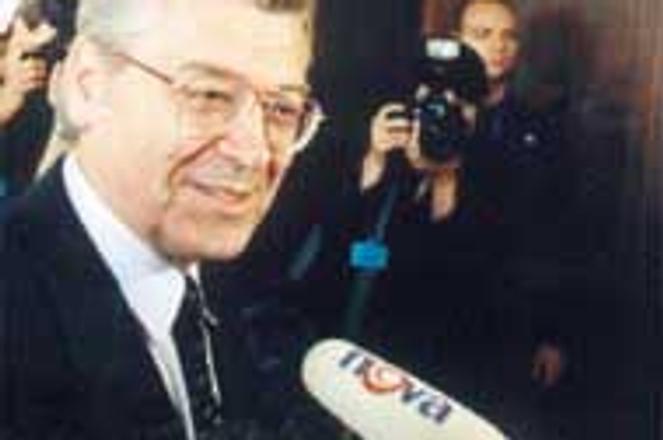Close, but no cigar. HZDS candidate Otto Tomeček became the most successful suitor for the Slovak presidency to date, but still fell four votes shy of being elected to the post by Parliament.Vladimír Hák
Otto Tomeček, the Rector of Matej Bel University in Banská Bystrica and the Presidential candidate nominated by Premier Vladimír Mečiar's party, HZDS, has come the closest so far in the Slovak Parliament's protracted effort to elect the country's second President.
Tomeček received 86 votes in two secret ballots held on July 9, the fifth month that parliamentary deputies have attempted, without success, to agree on a new leader for the country.
Still, Tomeček was the most successful candidate so far, falling only four votes shy of the 90 votes required by the Constitution to name a new president. A HZDS member whose membership is temporarily "frozen" because of his academic position, Tomeček did not expect himself to be elected. "Opposition deputies let it be known that I would not be elected," he said. "[However], it was an interesting experience," added the rector of the only Slovak university where government officials often come to give lectures.
Reflecting the polarization in the chamber, opposition deputies largely abstained from voting. Consequently, only 105 deputies voted in the first ballot and a paltry 92 participated in the second. "I voted according to the party line - against Tomeček," conceded Milan Ftáčnik, a deputy for the opposition Party of Democratic Left (SDĽ).
Even though the ballots were secret, it is highly probable that the 86 deputies voting in Tomeček's favor was the sum of 81 deputies of the governing coalition (HZDS, ZRS and SNS) and 5 independent deputies who often vote with the government. The ZRS faction fell apart just one day before the vote (see story on page 3). However, it is believed that all deputies who defected from the ZRS to Naše Slovensko (Our Slovakia) movement still voted for the government candidate.
Ftáčnik stated that the HZDS itself was to blame for its candidate's failure. "For one thing, the HZDS did not consider it necessary to really talk to other parties [about the nominee]," he said, adding that Tomeček did not fit the criteria agreed to before the vote between the SDĽ and the government parties. "He is neither internationally recognized, nor a non-partisan individual," explained Ftáčnik.
Ján Cuper, a HZDS legal expert, vehemently disagreed. "I think Tomeček fulfilled the criteria," he said, adding that Ftáčnik's arguments were "poppycock." However, Jaroslav Paška, a deputy for the coalition Slovak National Party (SNS), thought that the HZDS could have made more advances toward the opposition in order to get a President elected. "Since he was a HZDS candidate, we left the talks up to the HZDS," Paška said.
The issue now vexing legal experts is whether Parliament will have to meet again within 30 days, as prescribed by the Constitution, to go through what definitely will be the last round of Presidential elections before the September general elections. "There is a battle looming over whether a constitutional deadline applies when parliament is not in session," Ftáčnik explained.
But Cuper countered by saying that "parliament will have to meet if there is a candidate." Paška remarked that due to the election campaign, it will be difficult to get 90 deputies to even come to parliament. "I personally doubt that it makes sense," he said.


